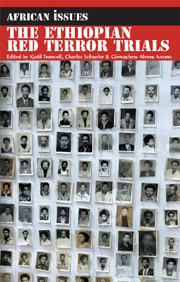Book contents
- Frontmatter
- Contents
- Notes on Contributors
- Preface
- Acknowledgements
- Abbreviations
- Glossary of Amharic Phrases
- 1 The ‘Red Terror’ Trials
- 2 The History of the Red Terror
- 3 The Rights of the Accused
- 4 The Role of the Special Prosecutor's Office
- 5 The Red Terror Trials versus Traditions of Restorative Justice in Ethiopia
- 6 A Quest for Justice or the Construction of Political Legitimacy?
- 7 Building State & Nation
- 8 Beyond the Red Terror Trials
- 9 Concluding the Main Red Terror Trial
- Index
7 - Building State & Nation
Justice, Reconciliation & Democratization in Ethiopia & South Africa
Published online by Cambridge University Press: 12 September 2012
- Frontmatter
- Contents
- Notes on Contributors
- Preface
- Acknowledgements
- Abbreviations
- Glossary of Amharic Phrases
- 1 The ‘Red Terror’ Trials
- 2 The History of the Red Terror
- 3 The Rights of the Accused
- 4 The Role of the Special Prosecutor's Office
- 5 The Red Terror Trials versus Traditions of Restorative Justice in Ethiopia
- 6 A Quest for Justice or the Construction of Political Legitimacy?
- 7 Building State & Nation
- 8 Beyond the Red Terror Trials
- 9 Concluding the Main Red Terror Trial
- Index
Summary
Introduction
A brutal, repressive regime creates what Vaclav Havel (1991: 391) calls a ‘contaminated moral environment’ where both state and society are scarred by violence, fear and inhumanity. The consolidation of a new democracy burdened with such a legacy thus requires the creation of ‘[…] a new type of society, a new form of politics, and a new kind of people’ (Parlevliet, 1998: 174), which in turn requires dual processes of the democratization of state and civil society. There is a near-global consensus that this demands a reckoning of some kind with the past, but what form this should take is controversial.
There are two core elements of such a reckoning. The first is the creation of an account of the past, in order to establish a historical record, or a collective memory, of the atrocities committed. In his novel The Book of Laughter and Forgetting, Milan Kundera (1980: 3) writes that ‘the struggle of man against power is the struggle of memory against forgetting’, and the creation of a public memory of past abuse of power is indeed seen as a weapon against future abuse of power. The second element relates to dealing with the perpetrators of the atrocities, and this is the more controversial part of the process. Strategies range along a continuum with the prosecution of perpetrators at the one end and blanket amnesty at the other, and a number of other options in between.
- Type
- Chapter
- Information
- The Ethiopian Red Terror TrialsTransitional Justice Challenged, pp. 98 - 115Publisher: Boydell & BrewerPrint publication year: 2009



